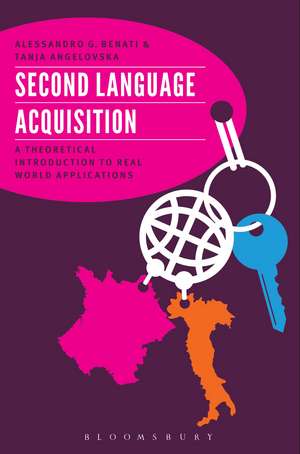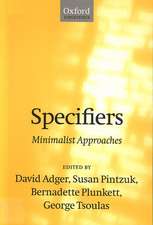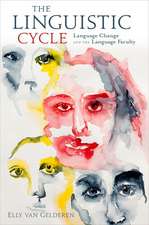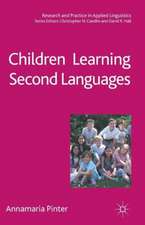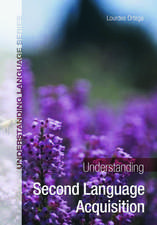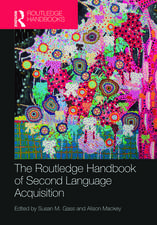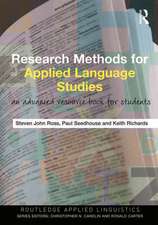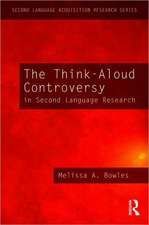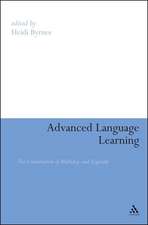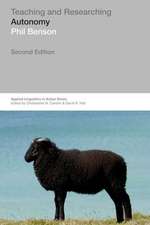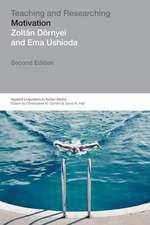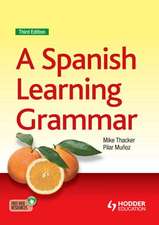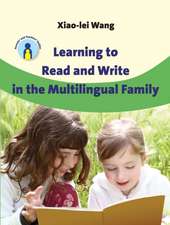Second Language Acquisition: A Theoretical Introduction To Real World Applications
Autor Professor Alessandro G. Benati, Tanja Angelovskaen Limba Engleză Paperback – 24 feb 2016
| Toate formatele și edițiile | Preț | Express |
|---|---|---|
| Paperback (1) | 237.28 lei 6-8 săpt. | |
| Bloomsbury Publishing – 24 feb 2016 | 237.28 lei 6-8 săpt. | |
| Hardback (1) | 948.07 lei 3-5 săpt. | |
| Bloomsbury Publishing – 24 feb 2016 | 948.07 lei 3-5 săpt. |
Preț: 237.28 lei
Preț vechi: 289.02 lei
-18% Nou
Puncte Express: 356
Preț estimativ în valută:
45.40€ • 47.40$ • 37.58£
45.40€ • 47.40$ • 37.58£
Carte tipărită la comandă
Livrare economică 04-18 aprilie
Preluare comenzi: 021 569.72.76
Specificații
ISBN-13: 9780567200198
ISBN-10: 0567200191
Pagini: 200
Dimensiuni: 156 x 234 x 18 mm
Greutate: 0.34 kg
Editura: Bloomsbury Publishing
Colecția Bloomsbury Academic
Locul publicării:London, United Kingdom
ISBN-10: 0567200191
Pagini: 200
Dimensiuni: 156 x 234 x 18 mm
Greutate: 0.34 kg
Editura: Bloomsbury Publishing
Colecția Bloomsbury Academic
Locul publicării:London, United Kingdom
Caracteristici
By acknowledged experts in field who are widely published at a theoretical and practical level.
Notă biografică
Professor Alessandro G. Benati is Director of CAROLE at the University of Greenwich, UKTanja Angelovska is Assistant Professor of English Linguistics at the Universität Salzburg, Austria
Cuprins
1. Introduction to second language acquisition2. Similarities and differences between first and second language acquisition3. How learners process information in second language acquisition 4. How the internal system develops in a second language5. How learners learn to communicate in a second language 6. What we know in SLA Bibliography Index
Recenzii
A very good resource to introduce students and trainees to the topic of SLA in such a way that it can be easily understood. This knowledge is reinforced by the activities included and the references for further research on the topic ... The authors cover and review all the main areas of knowledge of this topic in an engaging, practical way for anyone dealing with this complex matter for the first time. In short, the main strength of this book is to help learners and teachers to tackle the numerous studies and theories on this issue.
As promised, this book provides an overview of SLA that is beginner-friendly. This is in contrast to other introductory texts that focus more on analyzing theories and their originating studies (e.g. VanPatten & Williams, 2015). What this allows for is gaining a general understanding that can aid teachers in thinking through both the rationale underpinning what they do in the classroom and the progression of the field informing their work. Moreover, the text gives clear suggestions for the classroom, such as meaningful, task-based activities. The inclusion in this text of information regarding multilinguals and heritage speakers is especially welcome, since these types of students are increasingly common and have different needs than the traditional L2 learner who only has speaks one L1.
This book demonstrates that knowing how languages learned help language instructors to develop a more innovative and effective way to teach foreign languages and to create the necessary conditions for students to learn more efficiently and appropriately.
Readers searching for an introductory text that explores how second languages are learned alongside effective teaching practices need not look further. Second Language Acquisition: A Theoretical Introduction to Real World Applications is sure to please undergraduate students and future educators who will highly benefit from the down-to-earth foundation that it provides. The text not only reviews key theories and findings that are essential to becoming familiar with innovative language pedagogies, but it also encourages readers to reflect on how to further improve these teaching techniques.
As promised, this book provides an overview of SLA that is beginner-friendly. This is in contrast to other introductory texts that focus more on analyzing theories and their originating studies (e.g. VanPatten & Williams, 2015). What this allows for is gaining a general understanding that can aid teachers in thinking through both the rationale underpinning what they do in the classroom and the progression of the field informing their work. Moreover, the text gives clear suggestions for the classroom, such as meaningful, task-based activities. The inclusion in this text of information regarding multilinguals and heritage speakers is especially welcome, since these types of students are increasingly common and have different needs than the traditional L2 learner who only has speaks one L1.
This book demonstrates that knowing how languages learned help language instructors to develop a more innovative and effective way to teach foreign languages and to create the necessary conditions for students to learn more efficiently and appropriately.
Readers searching for an introductory text that explores how second languages are learned alongside effective teaching practices need not look further. Second Language Acquisition: A Theoretical Introduction to Real World Applications is sure to please undergraduate students and future educators who will highly benefit from the down-to-earth foundation that it provides. The text not only reviews key theories and findings that are essential to becoming familiar with innovative language pedagogies, but it also encourages readers to reflect on how to further improve these teaching techniques.
